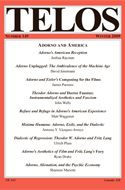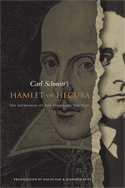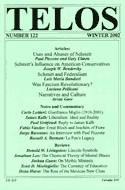By Nicole Burgoyne · Monday, February 22, 2010 Shannon Mariotti’s article “Damaged Life as Exuberant Vitality in America: Adorno, Alienation, and the Psychic Economy” appears in Telos 149 (Winter 2009): Adorno and America. Nicole Burgoyne follows up with some questions.
 Nicole Burgoyne: One of your main concerns with psychoanalysis as it developed in America in the postwar era is that it accepted a commercialized and materialistic view of happiness as an ideal. One can see how this sort of obsession with living life to the fullest is at odds with Freud’s early work toward curing suffering individuals and his later theories on the repressive nature of society in general. Do you see this uniquely American form of psychoanalysis, which Adorno characterizes as the loss of the individual experience, as related to his critique of America’s culture industry? Why are these phenomena prominent in American culture as opposed to elsewhere? Nicole Burgoyne: One of your main concerns with psychoanalysis as it developed in America in the postwar era is that it accepted a commercialized and materialistic view of happiness as an ideal. One can see how this sort of obsession with living life to the fullest is at odds with Freud’s early work toward curing suffering individuals and his later theories on the repressive nature of society in general. Do you see this uniquely American form of psychoanalysis, which Adorno characterizes as the loss of the individual experience, as related to his critique of America’s culture industry? Why are these phenomena prominent in American culture as opposed to elsewhere?
Continue reading →
By Nicole Burgoyne · Wednesday, December 9, 2009 Carl Schmitt’s Hamlet or Hecuba: The Intrusion of the Time into the Play is now available in English translation from Telos Press. Nicole Burgoyne recently discussed some of the book’s central arguments with translator David Pan.
 Nicole Burgoyne: Hamlet or Hecuba: The Intrusion of the Time into the Play represents a bit of a departure from Schmitt’s usual juristic theoretical work. At the beginning of the book he makes quite clear that he means to appeal to the literary lover of Shakespeare and to provide a new understanding of the text. How important was literature to Schmitt? Is literature simply another vehicle to explore Schmitt’s other key concepts, such as his definition of the sovereign, the exception, the friend/enemy dichotomy, etc.? Nicole Burgoyne: Hamlet or Hecuba: The Intrusion of the Time into the Play represents a bit of a departure from Schmitt’s usual juristic theoretical work. At the beginning of the book he makes quite clear that he means to appeal to the literary lover of Shakespeare and to provide a new understanding of the text. How important was literature to Schmitt? Is literature simply another vehicle to explore Schmitt’s other key concepts, such as his definition of the sovereign, the exception, the friend/enemy dichotomy, etc.?
David Pan: Literature was important to Schmitt from very early in his career; one of his first publications was a book of literary criticism on the Expressionist poem Nordlicht, by Theodor Däubler. This interest was linked to his political theory to the extent that this theory began with the assumption that politics was based in theology. Though his Roman Catholicism and Political Form theorizes this link in terms of the Catholic Church, his nationalist attitudes brought his interest in theology back to an engagement with the kinds of literary texts, such as Hamlet for England, that make up a national culture.
Continue reading →
By Nicole Burgoyne · Tuesday, December 8, 2009 Each Tuesday in the TELOSscope blog, we reach back into the archives and highlight an article whose critical insights continue to illuminate our thinking and challenge our assumptions. Today, Nicole Burgoyne looks at Donald W. Livingston’s “Lincoln Symbols,” a review of Barry Schwartz’s Abraham Lincoln and the Forge of National Memory, from Telos 122 (Winter 2002).
 In his 2002 review of Abraham Lincoln and the Forge of National Memory, Donald W. Livingston praises author Barry Schwartz for grappling with the theory of commemorative national memory and images, but then proceeds to tear the substance of Schwartz’s argument to bloody bits. The issue of “truth” proves to be Livingston’s main point of contention in this article, which not only points out the discrepancies between Lincoln myth and reality, but poses a polemical alternative to the ideals that Lincoln is meant to represent. In his 2002 review of Abraham Lincoln and the Forge of National Memory, Donald W. Livingston praises author Barry Schwartz for grappling with the theory of commemorative national memory and images, but then proceeds to tear the substance of Schwartz’s argument to bloody bits. The issue of “truth” proves to be Livingston’s main point of contention in this article, which not only points out the discrepancies between Lincoln myth and reality, but poses a polemical alternative to the ideals that Lincoln is meant to represent.
Continue reading →
By Nicole Burgoyne · Tuesday, October 6, 2009 Each Tuesday in the TELOSscope blog, we reach back into the archives and highlight an article whose critical insights continue to illuminate our thinking and challenge our assumptions. Today, Nicole Burgoyne looks at Jonathan Leo’s “The Chemical Theory of Mental Illness,” from Telos 122 (Winter 2002).
 Even the first-time reader of Freud recognizes some outdated theory, in part because he or she has already heard Freudian psychology made fun of as part of the pop culture understanding of psychotherapy. But has Freud’s legacy—talk therapy—become obsolete in education as well as in practice? In his 2002 article “The Chemical Theory of Mental Illness,” Jonathan Leo reviews two books that analyze a still dominant trend toward biological psychiatry in modern day academia and the general public. Leo takes a closer look at the idea that mental illnesses are just like other diseases, chemical imbalances that should be rectified by introducing ameliorating substances. Even the first-time reader of Freud recognizes some outdated theory, in part because he or she has already heard Freudian psychology made fun of as part of the pop culture understanding of psychotherapy. But has Freud’s legacy—talk therapy—become obsolete in education as well as in practice? In his 2002 article “The Chemical Theory of Mental Illness,” Jonathan Leo reviews two books that analyze a still dominant trend toward biological psychiatry in modern day academia and the general public. Leo takes a closer look at the idea that mental illnesses are just like other diseases, chemical imbalances that should be rectified by introducing ameliorating substances.
Continue reading →
By Nicole Burgoyne · Tuesday, September 1, 2009 Welcome to the launch of TELOSthreads, a new website feature that showcases the online archive of Telos articles from the past decade. Each Tuesday in the TELOSscope blog, we will reach back into the archives and highlight an article whose critical insights continue to illuminate our thinking and challenge our assumptions. We’ve also set up an index of TELOSthreads topics, which will allow you to browse the archive thematically. For the first article in this series, we turn to Jorge Raventos’s 2001 interview with Paul Piccone, “From the New Left to Postmodern Populism: An Interview with Paul Piccone,” published in Telos 122 (Winter 2002).
In a 2001 interview with Paul Piccone, Telos‘s founding editor discussed the emergence of the journal within the context of the New Left of the 1960s. For Piccone, Telos existed as a kind of opposition within the opposition, a political force that drew critical strength from what was then a vibrant New Left, but which also largely took issue with the movement.
Continue reading →
By Nicole Burgoyne · Saturday, March 28, 2009 Michèle C. Cone’s review of Alexandra Laignel-Lavastine’s Cioran, Eliade, Ionesco: l’oubli du fascisme: trois intellectuels roumains dans la tourmente du siècle (Paris: Presses Universitaires de France, 2002) appears in Telos 146. Nicole Burgoyne followed up with some questions.
Nicole Burgoyne: In discussing the success of Ionesco, Cioran, and Eliade in postwar France, despite their earlier ties to the Fascists, you postulate that in addition to the authors’ successful hiding of their past, a “conscious or unconscious complicity” of France’s postwar intellectual community provided a supporting network. Do you subscribe to such historical accounts of postwar France’s national narrative as Henry Rousso’s The Vichy Syndrome: History and Memory in France Since 1944? Rousso’s history traces the development of Gaullist myth as a political creation, but credits creative works like The Sorrow and the Pity with shattering it. Where do Lavastine’s three subjects, and her research itself, fit into this history?
Continue reading →
|
|
 Nicole Burgoyne: One of your main concerns with psychoanalysis as it developed in America in the postwar era is that it accepted a commercialized and materialistic view of happiness as an ideal. One can see how this sort of obsession with living life to the fullest is at odds with Freud’s early work toward curing suffering individuals and his later theories on the repressive nature of society in general. Do you see this uniquely American form of psychoanalysis, which Adorno characterizes as the loss of the individual experience, as related to his critique of America’s culture industry? Why are these phenomena prominent in American culture as opposed to elsewhere?
Nicole Burgoyne: One of your main concerns with psychoanalysis as it developed in America in the postwar era is that it accepted a commercialized and materialistic view of happiness as an ideal. One can see how this sort of obsession with living life to the fullest is at odds with Freud’s early work toward curing suffering individuals and his later theories on the repressive nature of society in general. Do you see this uniquely American form of psychoanalysis, which Adorno characterizes as the loss of the individual experience, as related to his critique of America’s culture industry? Why are these phenomena prominent in American culture as opposed to elsewhere?  Nicole Burgoyne: Hamlet or Hecuba: The Intrusion of the Time into the Play represents a bit of a departure from Schmitt’s usual juristic theoretical work. At the beginning of the book he makes quite clear that he means to appeal to the literary lover of Shakespeare and to provide a new understanding of the text. How important was literature to Schmitt? Is literature simply another vehicle to explore Schmitt’s other key concepts, such as his definition of the sovereign, the exception, the friend/enemy dichotomy, etc.?
Nicole Burgoyne: Hamlet or Hecuba: The Intrusion of the Time into the Play represents a bit of a departure from Schmitt’s usual juristic theoretical work. At the beginning of the book he makes quite clear that he means to appeal to the literary lover of Shakespeare and to provide a new understanding of the text. How important was literature to Schmitt? Is literature simply another vehicle to explore Schmitt’s other key concepts, such as his definition of the sovereign, the exception, the friend/enemy dichotomy, etc.?  In
In 

